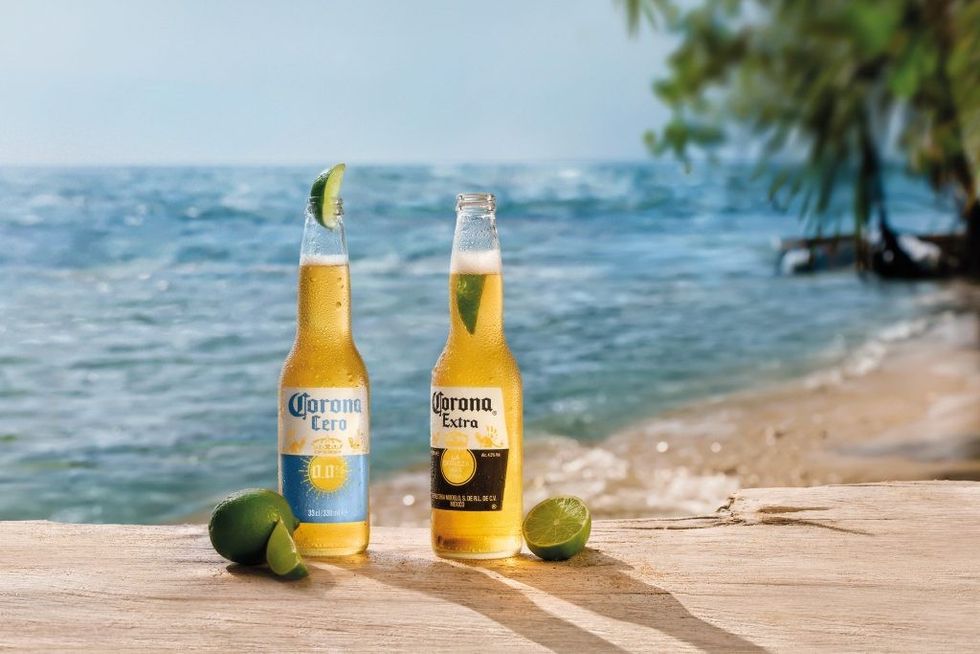Budweiser Brewing Group UK&I is predicting a stable year for beer sales – up 0.4 per cent from 2023[i] with exciting moments and events driving at-home drinking occasions.
The last four years have been marked by tumultuous events, from the pandemic and lockdown to the current cost of living crisis. The result has been a huge shift in consumer drinking behaviours, the most notable being the rise of the Big Night In driven by heightened in-home experiences such as mealtimes. As we head into another year where shopper budgets will likely be squeezed, there’s a huge opportunity for retailers to capitalise on this trend and drive sales, the AB InBev subsidiary said.
“While the future is always uncertain, one trend persists – a strong demand for at-home drinking occasions,” says Maria Neves, head of category management for the UK at Budweiser Brewing Group.
“To embrace this opportunity and address the growing interest in occasions such as the Big Night In, retailers need to stay abreast of evolving consumer demand. At Budweiser Brewing Group, we’re committed to working closely with our retail partners to help them understand their shoppers better and adjust their stock to suit these preferences, in turn boosting sales.”
Budweiser Brewing Group has identified five key beer-led opportunities for the off-trade heading into 2024.
Mealtimes
Beer is increasingly becoming a mealtime staple, 63 per cent of at-home beer consumption takes place with food, compared to just 58 per cent for total alcohol.[ii] While Special Occasions are winning in-home share, informal meals and light snacks drive most of the volume - 39 per cent of consumers enjoy a beer alongside their evening snack which represents a huge £30.7m opportunity.[iii] Continental and standard lager are a big part of these occasions but some premium brands also over-index so stores should ensure they are pairing food and beer on shelf and through in-store signage to maximise sales.
Top tip: Stella Artois has a deep affinity with food and is now enjoyed by shoppers more often with food than as a standalone drink.[iv] Retailers should leverage the beer brand's association with food through clever merchandising and food and beer pairings to boost basket spend.

Passion for Premium
Whilst shoppers are cutting back on larger expenditures, alcohol is one area where they are happy to trade up. This has led to huge growth in the premium category which isn’t something retailers should expect to see go away anytime soon. Budweiser Brewing Group is forecasting that by 2025, 65 per cent of total beer consumption will be from brands in the premium or super-premium category.[v]
Within the premium category, World Beer has been a standout winner. Since 2019, consumers have purchased 5 per cent more World Beer in comparison to standard lager and we forecast a further 8 per cent increase in sales by 2030.[vi]
Top tip: This category presents a huge opportunity, not only is it not going away any time soon, but it also allows retailers to encourage beer drinkers to trade up, something which is now worth £131m.[vii] Retailers should ensure they’re stocked up on best-loved premium World Beer options including Corona and Stella Artois to capture this spend.
Alcohol-Free: Anytime, Any Month
Whether it’s Dry January, Sober October, or any other month in the year – consumers are eager to moderate their drinking whilst still enjoying the taste of their favourite beer. Over the last few years, there has been a huge rise in the no-and-low alcohol category – now worth over £172m across the off-trade alone.[viii]
The younger generation (18–34-year-olds) over-index the most in the no-and-low category, highlighting a wider cultural shift.[ix] Stocking no-and-low options will therefore not only cater to existing customers but will also recruit new consumers into the category.
However, whilst retailers should stock up during these key selling moments, the no-and-low category is gaining momentum all year so retailers should ensure they have a wide selection of alcohol-free versions on shelf.
Top tip: If consumers decide to moderate their alcohol consumption, they tend to start with a brand they already know and love. Budweiser Brewing Group now offers its best-loved beers in alcohol-free format. The launch of Budweiser Zero, Stella Artois Alcohol-Free and Corona Cero allow shoppers to moderate their alcohol consumption whilst still enjoying the taste of their favourite beer.
Scoring Big with Beer
The return of international sport brings a summer of opportunities for retailers, particularly with much-anticipated events such as the Euros. Every year, the men’s World Cup and Euro is the biggest occasion of the year, presenting a huge opportunity for retailers. Given the current success of the England’s men team, the tournament has the opportunity to drive 18.2 per cent sales uplift in the off-trade during Euro 2024.[x]
As the official sponsor of the England Men’s Football Team, the Budweiser Family achieved 7.7 per cent penetration during the Euros 2020 – the highest of any beer brand.[xi] Budweiser will be helping retailers make the most of the summer of sport with a range of planned giveaways and POS support.
Top tip: It’s not just beer fans that will be stocking up; football entices new shoppers to the beer category, with known brands out-performing competitors. Retailers should ensure they are driving excitement on match days through in-store theatre and merchandising.
Cheers to Christmas
Christmas remains a key selling moment in the off-trade, and this year will be no exception. In the festive season, bottle packs have been a proven success and performed over index. Additionally, the World Beer category continues to be a standout, with a remarkable growth of 2.25 per cent compared to the previous year.[xii]
Top tip: During the festive season, people remain devoted to savouring the finest beers with family and friends. Retailers should ensure they stock up on Corona, allowing many to come together and celebrate Christmas once more with their favourite world beers.
[i] Budweiser Brewing Group, Forecasting, January 2024
[ii] Kantar Alcovision | 1 m/e 30th April 2021
[iii] Kantar Alcovision Share of Serves 12 m/e 30/06/22/21; Kantar Usage Panel, Beer at the Evening Snack, 52w/e 11 Jul 21, per cent Occasions, Index vs Total Food & Drink
[iv] Nielsen Scantrack data; 52 WE 28 December 2020
[v] Budweiser Brewing Group Forecasting January 2024
[vi] Kantar Alcovision Share of Occasions 12 m/e 30/06/22 vs 12 m/e 30/06/21: BBG own beer projections. Nielsen iSights: Total beer 2018/19/20/21/22
[vii] Budweiser Brewing Group, Category Vision 2023
[viii] Nielsen Total Off-Trade L52W W/E 20 January 2024
[ix] Kantar Alcovision 2023
[x] Budweiser Brewing Group internal forecasting, January 2023
[xi] Kantar 8 WE 11/7/21
[xii] Nielsen: total coverage LW W/E 23 Dec 2023







